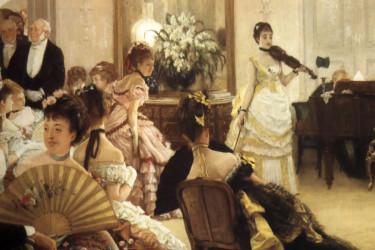
In previous years, they’ve spotlighted individual composers, instruments, geographical regions… but this season, Music@Menlo has as its theme Incredible Decades. Co-artistic directors David Finckel and Wu Han chose repertoire from seven decades, from the time of Bach through the age of Y2K fears.
There’s more information at the Music@Menlo website.
“We have done what we might call evolutionary surveys of the history of chamber music,” Finckel says, “Kind of taking it in a gradual crescendo of complexity and sophistication… But we’ve never taken slices of a pie, leaving other slices uneaten, as you might visualize.” And that made for some difficult choices, because a lot of music history would be left out. “I found this to be a fascinating… both a kind of restriction and an opportunity, because it allows us to focus very deeply on a single decade.” So while they began this past weekend with 1710-20, including Telemann, Vivaldi and Bach, for this Wednesday’s program they’ll then skip ahead 70 years, to 1790. “And what happened during that decade was that Beethoven came to Vienna, he took up residence there, and he took the town by storm. And he basically stole the spotlight away from Haydn.” Beethoven dominated the musical scene throughout his life, and so the third program goes to the end of his life in the 1820s, with his final quartet, paired with Schubert’s song cycle Die Winterreise. “They look at the imminent future in very very different ways. Beethoven is at ease with his fate, and philosophical and light-hearted, and Schubert is just the opposite.” Then it’s the revolutionary decade of 1840-50, with turbulent and romantic works by Schumann, Chopin and Mendelssohn. Two centuries’ finales are represented, with Brahms and German music passing the torch to France, Russia, and Czechoslovakia in the 1890s, and insecurity about the change of the millennium in the 1990s. Nestled between them was the paradoxical Roaring Twenties: “The years between the two World Wars were some of the most fertile culturally in history. There was a huge relief, and at the same time there was building anxiety. Mickey Mouse hit the big screen and Hitler published Mein Kampf.”







